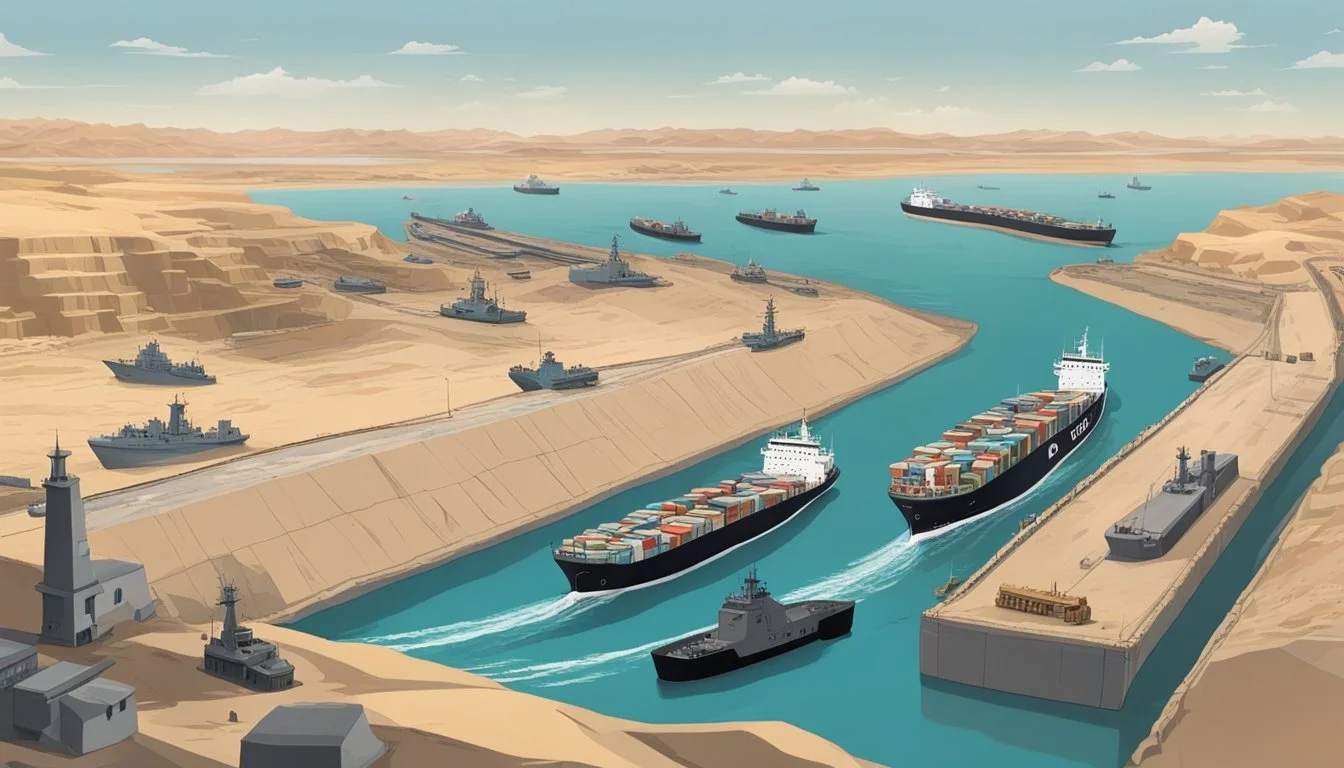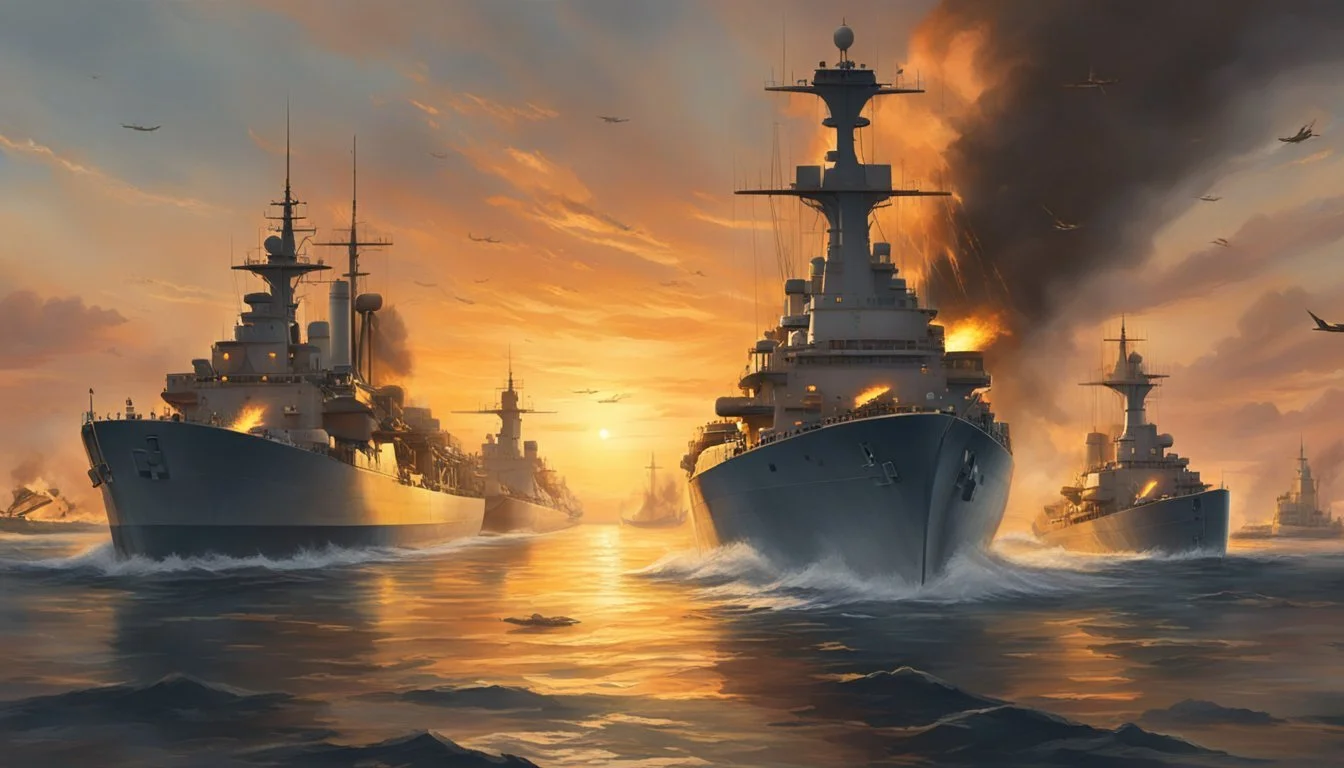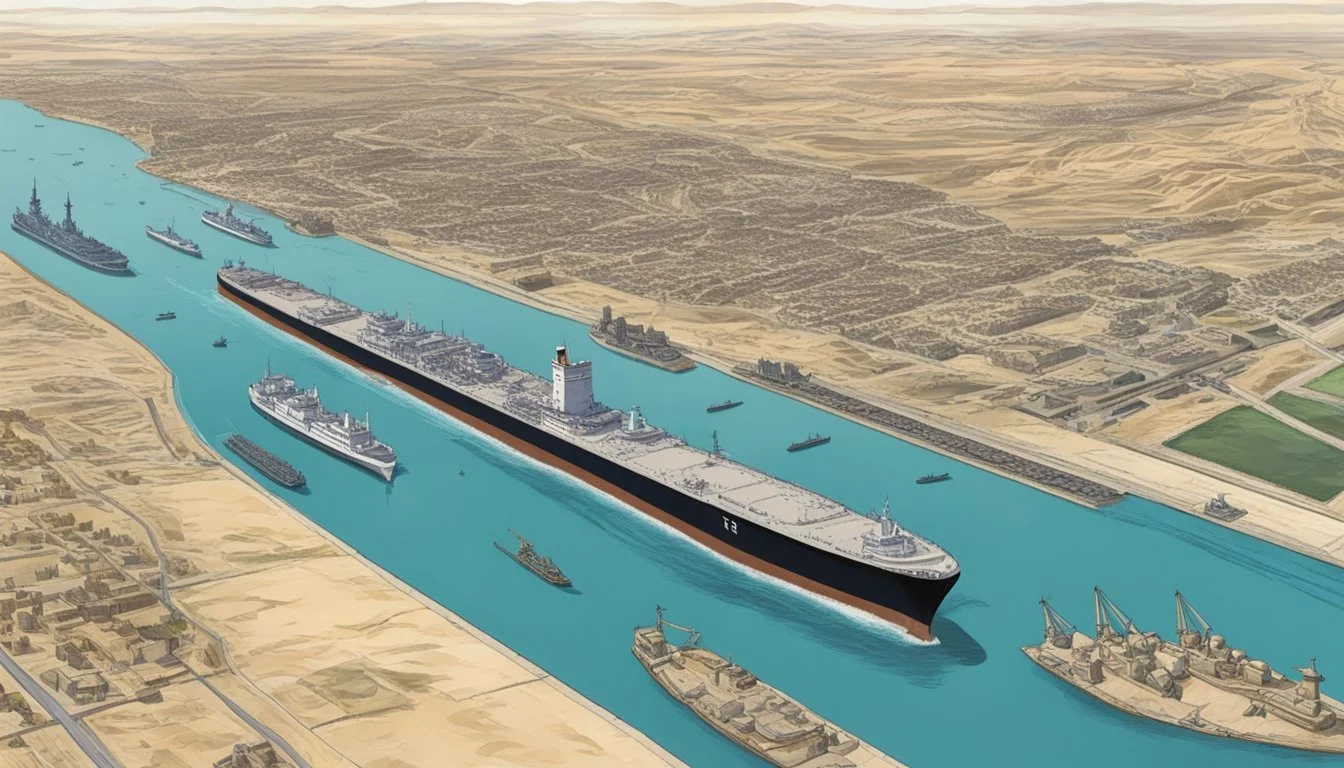Suez in Crisis: 7 Films on the 1956 Middle East Flashpoint
Cinematic Perspectives on a Cold War Turning Point
The Suez Crisis of 1956 was a pivotal moment in Middle Eastern geopolitics that captured global attention. This complex event involved multiple nations and had far-reaching consequences for international relations. Several films have explored this historical flashpoint, offering viewers diverse perspectives on the crisis and its impact.
These cinematic portrayals provide valuable insights into the political climate, key players, and underlying tensions that led to the Suez Crisis. By examining these films, audiences can gain a deeper understanding of this crucial period in 20th-century history and its lasting effects on the Middle East and beyond.
1) The Battle of the Nile (1951)
"The Battle of the Nile" is a 1951 British historical drama film directed by Frank Borzage. Set against the backdrop of Napoleon's Egyptian campaign, the movie focuses on the naval conflict between British and French forces in 1798.
The film portrays the strategic brilliance of Admiral Horatio Nelson as he leads the British fleet to victory over the French navy. It showcases the intense naval battle that took place in Aboukir Bay, near the mouth of the Nile River.
Starring David Farrar as Nelson, the film captures the tension and excitement of the battle. It depicts the British fleet's surprise attack on the anchored French ships, resulting in a decisive victory for the Royal Navy.
"The Battle of the Nile" offers viewers a glimpse into this pivotal moment in naval history. While not directly related to the 1956 Suez Crisis, the film provides historical context for British involvement in Egypt.
https://www.imdb.com/title/tt0043332/
2) The Band's Visit (2007)
"The Band's Visit" is a critically acclaimed comedy-drama film directed by Eran Kolirin. It tells the story of an Egyptian police band that accidentally ends up in the wrong Israeli town.
The film stars Sasson Gabai as the band's conductor and Ronit Elkabetz as a local café owner. Set against the backdrop of Israeli-Egyptian relations, it explores themes of cultural misunderstanding and human connection.
Despite its political setting, "The Band's Visit" focuses on personal interactions rather than larger conflicts. The film's gentle humor and poignant moments arise from the characters' attempts to communicate across language barriers.
While not directly about the Suez Crisis, the film reflects on its long-term impact on Egyptian-Israeli relations. It portrays a moment of unexpected cultural exchange between two groups traditionally seen as adversaries.
"The Band's Visit" received numerous awards and was adapted into a successful Broadway musical. Its unique perspective on Middle Eastern relations offers a refreshing counterpoint to more overtly political films about the region.
[https://en.wikipedia.org/wiki/The_Band%27s_Visit]
3) Paradise Now (2005)
Paradise Now explores the complex motivations behind suicide bombing in the Israeli-Palestinian conflict. Directed by Hany Abu-Assad, the film follows two Palestinian friends, Said and Khaled, as they prepare for a suicide attack in Tel Aviv.
The movie offers a nuanced portrayal of the protagonists, delving into their personal struggles and the societal pressures that drive them to such extreme actions. Abu-Assad's direction provides an intimate look at the final hours before their planned mission.
Paradise Now garnered critical acclaim for its balanced approach to a sensitive topic. The film won the Golden Globe for Best Foreign Language Film and received an Academy Award nomination in the same category.
Through its narrative, the movie raises questions about the cycle of violence and the human cost of conflict in the Middle East. It challenges viewers to consider the desperation and circumstances that can lead individuals to contemplate such drastic measures.
https://en.wikipedia.org/wiki/Paradise_Now
4) Cairo Time (2009)
Cairo Time is a romantic drama film set against the backdrop of modern Egypt's capital city. The movie stars Patricia Clarkson as Juliette, a magazine editor who travels to Cairo to meet her husband.
Unexpectedly left alone, Juliette finds herself drawn to Tareq, her husband's former colleague. As they explore the city together, a subtle romance develops between them.
The film captures the essence of Cairo's bustling streets and ancient landmarks. It offers glimpses of the Nile River, the pyramids, and local markets, providing a visual tour of the city.
While not directly addressing the Suez Crisis, Cairo Time portrays contemporary Egyptian society and touches on themes of cultural differences and unexpected connections.
https://en.wikipedia.org/wiki/Cairo_Time
5) Suez (1940)
Suez is a historical drama film directed by Allan Dwan and released in 1940. The movie stars Tyrone Power as Ferdinand de Lesseps, the French diplomat who played a crucial role in the construction of the Suez Canal.
The film portrays de Lesseps' efforts to build the canal, facing numerous challenges and obstacles along the way. It depicts his negotiations with the Egyptian government and his struggle to secure funding for the ambitious project.
Suez takes some liberties with historical accuracy, blending fact with fiction to create a more dramatic narrative. The movie includes a romantic subplot involving de Lesseps and a fictional love interest played by Loretta Young.
While not directly related to the 1956 Suez Crisis, the film provides context on the canal's significance and the complex international interests surrounding it. It offers a glimpse into the historical background that would later contribute to the tensions leading up to the crisis.
https://www.imdb.com/title/tt0030811/
6) Yomeddine (2018)
Yomeddine is an Egyptian drama film directed by Abu Bakr Shawky. While not directly about the Suez Crisis, it offers a unique perspective on modern Egypt and its social landscape.
The film follows Beshay, a man cured of leprosy, as he embarks on a journey across Egypt with an orphan boy. Their travels reveal the complexities of contemporary Egyptian society.
Yomeddine received critical acclaim for its heartfelt portrayal of marginalized characters. It competed for the Palme d'Or at the 2018 Cannes Film Festival and won the François Chalais Prize.
The film's exploration of identity and belonging in Egypt provides an indirect commentary on the nation's evolution since the Suez Crisis. It offers a human-centered view of a country shaped by historical events like the 1956 conflict.
https://en.wikipedia.org/wiki/Yomeddine
7) Beaufort (2007)
Beaufort is an Israeli war film directed by Joseph Cedar. While not directly about the Suez Crisis, it portrays the long-term consequences of Middle Eastern conflicts.
The movie is set in 2000, during the final days of Israel's occupation of southern Lebanon. It follows a group of Israeli soldiers stationed at the medieval Beaufort Castle.
Beaufort explores themes of war fatigue, military withdrawal, and the psychological toll on soldiers. The film reflects on Israel's evolving role in regional conflicts since the Suez Crisis era.
Cedar's work received critical acclaim for its tense atmosphere and nuanced portrayal of soldiers' experiences. It won the Silver Bear for Best Director at the Berlin International Film Festival.
Beaufort offers a thought-provoking look at the lasting impact of Middle Eastern geopolitics on individuals and nations. Its connection to the Suez Crisis lies in its examination of Israel's ongoing security challenges.
https://en.wikipedia.org/wiki/Beaufort_(film)
Historical Context of the Suez Crisis
The Suez Crisis of 1956 emerged from long-standing tensions over control of the strategically vital Suez Canal. It involved complex geopolitical dynamics between Egypt, Britain, France, Israel, the United States, and the Soviet Union during the Cold War era.
Geopolitical Tensions in 1956
The Suez Canal, opened in 1869, was a crucial waterway connecting the Mediterranean to the Red Sea. It allowed faster maritime trade between Europe and Asia. Britain and France had significant economic interests in the canal.
In July 1956, Egyptian President Gamal Abdel Nasser nationalized the Suez Canal Company. This move angered Britain and France, who saw it as a threat to their interests and influence in the region.
The Cold War backdrop intensified the situation. The United States and Soviet Union were vying for global influence, including in the Middle East.
Key Players and Nations Involved
Egypt, under Nasser's leadership, sought to assert its independence and control over the Suez Canal. Nasser's nationalist policies aligned with anti-colonial sentiments in the region.
Britain and France, former colonial powers, aimed to protect their economic interests and political influence in the Middle East. They viewed Nasser's actions as a challenge to their authority.
Israel, concerned about Egyptian hostility, saw an opportunity to weaken Nasser's regime. The country formed a secret alliance with Britain and France.
The United States, though allied with Britain and France, opposed military intervention. It feared Soviet involvement and the potential escalation of the Cold War.
The Soviet Union supported Egypt's right to nationalize the canal and threatened to intervene if attacked.
Impact of the Suez Crisis on Film
The Suez Crisis of 1956 left an indelible mark on cinema, influencing how filmmakers portrayed Middle Eastern politics and shaping global cinematic narratives. Its ripple effects can be seen in both documentary and fictional works produced in the decades following the event.
Portrayal of Middle Eastern Politics
Films addressing the Suez Crisis often depicted the complex web of international relations and power struggles in the region. "Nassar 56" (1996), an Egyptian production, portrayed President Gamal Abdel Nasser's perspective, highlighting nationalist sentiment and anti-colonial themes. The British film "Suez 1956" (1979) offered a more Western-centric view, examining the political fallout for the UK government.
Documentaries like "The Other Side of Suez" (2003) aimed for a balanced approach, incorporating multiple viewpoints and archival footage. These films contributed to a more nuanced understanding of Middle Eastern politics in popular culture.
Influence on Global Cinema
The Suez Crisis sparked interest in Middle Eastern settings and stories among international filmmakers. It paved the way for movies exploring themes of imperialism, nationalism, and conflict in the region. "Lawrence of Arabia" (1962), while set in an earlier period, drew parallels to the power dynamics exposed by the Suez Crisis.
French New Wave directors like Jean-Luc Godard referenced the crisis in films like "Le Petit Soldat" (1963), using it as a backdrop for broader political commentary. The event also influenced spy thrillers and political dramas, with the Middle East becoming a common setting for intrigue and conflict in international cinema.





